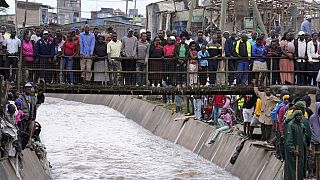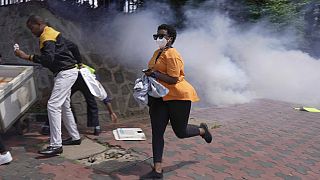Kenya
Students at Dandora Secondary School, in the east of Kenya’s capital Nairobi, are taking their health into their own hands.
Armed with gardening hoes, they are planting over a 100 bamboo seedlings in the school garden in the hope that the plants will filter the polluted air.
The school is situated right next to the country’s largest dumpsite, and acrid fumes from the waste have been affecting their health.
The Dandora site was declared full over 20 years ago, but hundreds of trucks still arrive leaving about 2,000 tonnes of waste every day from around Nairobi.
It occupies approximately 50 hectares of land and affects the whole neighbourhood, with the heavy stench detected from kilometres away.
"The dumpsite produces gas in the morning and the afternoon. Seeing is becoming a problem in the morning. It produces a fog which really pollutes the environment, produces bad smells,” says 17- year-old student, Allan Sila.
“Some of the challenges that really affect us is the smell and the smoke. Burning of those elements in there produces smoke that triggers asthma. Asthma is a disease that is commonly known at the school."
When new principal, Eutychus Maina, arrived at the school last year he was welcomed by the filthy smell and smoke.
He knew he had to do something when cases of respiratory illnesses started increasing among students and teachers.
"My motivation for initiating the bamboo project was to mitigate the effects of the dumpsite. It really pollutes the air that we breathe and I know it is going to reduce the cases of respiratory infections amongst the people in Dandora community," he says.
Bamboo is the fastest-growing plant on earth and is seen as one of nature’s finest air purifier. It also absorbs twice as much carbon dioxide as trees, and generates an impressive amount of oxygen.
"Planting bamboo trees ensures that there is a barrier in terms of the polluted air that is coming through, especially when you look at the fine particles,” says UN Environment Programme (UNEP) Africa Regional Air Quality expert, Aderiana Mbandi.
“Of course the bamboo, being a plant, ensures that there is photosynthesis and this ensures that it is producing oxygen while also intaking carbon dioxide."
The school relies on donations to buy the seedlings that retail at $3 each, but is determined to keep going until the entire 900-metre wall separating it from the dumpsite is covered.
And Dandora Secondary School is not stopping there. They have planted more than 4,000 trees of different species of trees to create better air circulation.
UNEP, in partnership with the Stockholm Environment Institute, deployed sensors to the Dandora neighbourhood from October last year to April to monitor pollution levels from the dumpsite.
Out of the 166 days monitored, only 12 met the World Health Organization’s guidelines for a daily average of excellent air quality conditions.
For the students at Dandora Secondary School, the bamboo project is their way of fighting back.











01:39
Turning trash into treasure: financing school fees with waste
01:11
South Sudan resumes Tumaini peace talks in Nairobi
01:34
Negotiators in South Korea fail to clinch agreement addressing plastic polliution
01:00
No Comment: police fire tear gas at women's march in Kenya
01:44
Plastic pollution: Nations meet in final round of talks to strike treaty
01:37
Record participation at 24th Sofi Great Ethiopian Run